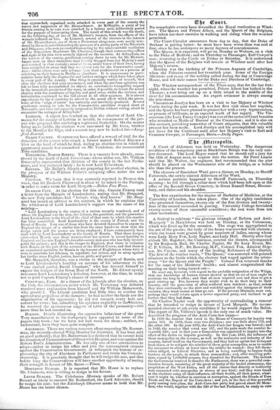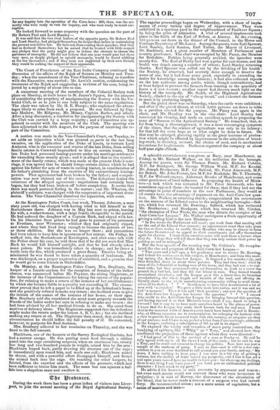gbt _Metropolis.
A Court of Aldermen was held on Wednesday. The dangerous. condition of the temporary pier at Blackfriars Bridge was the only sub- ject discussed. The Lord Mayor stated that he should call a jury for the 12th of August next, to inquire into the matter. Sir Peter Laurie said that Mr. Walter, the engineer, had recommended that the pier should be placed on the Westminster side of the bridge, as a better site than the present.
The electors of Bassishaw Ward gave a dinner, on Monday, to Sheriff Farncomb, the newly-elected Alderman of the Ward.
A serious accident happened to Sheriff Farncomb, on Thursday morning : he fell through a cellar-door which hattheen left open at the office of the Kensall Green Cemetery, in Great Russell Street, Blooms- bury, and dislocated his shoulder.
The first examination for the degree of Bachelor of Medicine, at the University of London, has taken place. Out of the eighty candidates who presented themselves, twenty-six of the first division and twenty- four of the second succeeded in passing. University College furnished twenty-seven of these successful candidates ; the rest were from ten other institutions.
A festival to celebrate "the glorious triumph of Reform and Anti- Monopoly" in Marylebone was held on Monday, at the Colosseum,
which was fitted up for the occasion. The stage was appropriated to the use of the guests ; the body of the house was crowded with electors ; while the boxes were graced by great numbers of ladies, among whom were Lady Mary Fox, Lady Napier, and Lady Hall. Shortly after four o'clock Mr. Bagshaw, the Chairman, entered the theatre, accompanied by Sir Benjamin Hall, Sir Charles Napier, Sir De Lacy Evans, Mr. C. P. Villiers, ALP., Dr. Bowring, M.P., Colonel Fox, Admiral Skip- son, Dr. Carpue, and many of the leading Reformers of the district. The first of the routine toasts, "The Queen," was seasoned with pointed allusions to the battle which the electors had waged against the aristo- cracy "for the Queen and the People." Colonel Fox returned thanks for the toast of the Ministers' health ; and almost congratulated the meeting on their being turned out— He must say, however, with regard to the probable resignation of the Whip, that our knowledge of human nature showed us that no set of men ought to continue too long in office; and that all men required now and then to get a good stirring up. For, however they might wish to do their duty to their country, still the possession of office rendered men indolent ; so that, unless they were continually on the alert and watchful against the intrigues of their enemies, they must sooner or later go out. If the present Ministers went out, perhaps they would return again a better- organized party, and inclined to go further than they had done. Sir Charles Napier took the opportunity of contradicting a rumour that he intended to resign in favour of Lord Morpeth. He recom- mended electors to ask every candidate if he would support the Ballot. The report of Mr. Villiers's speech is the only one of much value. He described the progress of the Anti-Corn-law cause— In 1838 the number that voted in the House of Commons for inquiry was under 100. In 1839, there were two divisions ; one was little shove 170, and the other 190. In the year 1839, the Anti-Corn-law League was formed; and in 1840, the number that voted was 197, and the pairs made the number fa- vourable 220; and in that year a Committee was appointed to inquire into the effect of the duties on imports generally. In this year, 1841, the influence of those monopolies on the revenue, as well as the commerce and industry of the country, forced itself on the Government, and they had no option but to impose fresh taxes, or to mitigate the mischief of these great monopolies, so EIS to enable the consumer to obtain at lower rates the articles he wanted : they felt them- selves obliged, as Liberal Ministers, and as being unwilling to impose fresh burdens on the people, to attack those monopolists; and, after receiving peti- tions signed by 1,800,000 persons, they dissolved the Parliament. The instant the Government resolved to dissolve the Parliament, there was a powerful com- bination formed, consisting of the great majority of the landed aristocracy, the proprietors of the West Indies, and all the classes that directly or indirectly were connected with monopolies or abuses of any kind; and they were found at the elections using all their influence, all their wealth, all their power, what- ever it might be, whether in coercion or corruption, against the friends of Free Trade and the Repeal of the Corn-laws : and yet, in the face of this powerful party coming into place, the Anti-Corn-law party had gained about 60 Mem- bers, who would, together with the 220 of the last Parliament, be ready to vote
for any inquiry into the operation of the Corn-laws : 280, then, was the mi- nority who were ready to vote for inquiry, and who were ready to resist cor- ruption.
He looked forward to some coquetry with the question on the part of Sir Robert Peel and Lord Stanley— It was said that the two rival leaders of the opposite party, Sir Robert Peel and Lord Stanley, had pledged themselves far deeper than before in maintaining the present restnctive law. Ile believed, from reading their speeches, that they bad so declared themselves; but he owned that he treated with little respect any pledges that the party might give to induce the electors to choose the partisans of monopoly. He did not believe that one year would pass but these very men, so deeply pledged to uphold monopoly, would be found nibbling at the law themselves ; and if they were not supported by their own friends, they would be seeking the support of their opponents.
The Court of Proprietors of the East India Company continued the discussion of the affairs of the Rajah of Sattara on Monday and Tues- day; when the amendment of the Vice-Chairman, refusing to interfere with the Executive, was carried ; Mr. Lewis's motion, condemning the treatment of the Rajah and suggesting a revision of his case, being re- jected by a majority of about two to one.
A numerous meeting of the members of the Colonial Society took place on Monday, at their house in St. James's Square, for the purpose of considering the propriety of amalgamating the Society with the Co- lonial Club, so as to join in one body subject to the same regulations. The chair was taken by Mr. H. E. Sharpe ; who explained the advan- tages likely to arise from such a proposal. He was followed by Cap- tain Mathew, Mr. Ridgway, Mr. Money, Captain Barber, and others. After a long discussion, a resolution for amalgamating the Society with the Club was carried by a large majority ; and a Committee was ap- pointed to confer with the members of the Club. The meeting was then adjourned to the 20th August, for the purpose of receiving the re- port of the Committee.
A motion was made in the Vice-Chancellor's Court, on Tuesday, to set aside an injunction which was granted ex pare in the last long vacation, on the application of the Duke of Leeds, to restrain Lord Amherst, who is the executor and trustee of the late Duke, from selling family estates in Cornwall bequeathed to him on certain trusts. The late Duke had possessed leasing-powers under his marriage-settlement far exceeding those usually given ; and it is alleged that on the resettle- ment of the family estates, which was made at the present Duke's mar- riage, it was agreed that he should forego certain claims which he had against his father for acts of waste in cutting timber, in consideration of Ins father's abstaining from the exercise of his extraordinary leasing- powers. That agreement had been broken by the father ; and compen- sation was now claimed out of his assets. The defendant denied the existence of the alleged agreement : negotiations had certainly been begun, but they had been broken off before completion. It seems that there was much personal feeling in the matter ; and Mr. Wharton, the plaintiff's solicitor, was charged with the suppression of important docu- ments. The Vice-Chancellor dissolved the injunction, with costs.
At the Kensington Police Court, last week, Thomas Johnson, a man sixty years old, was charged with having tried to kill himself in the Stationhouse there. Johnson was in May last sent to prison, leaving his wife, a washerwoman, with a large family chargeable to the parish. Ile had seduced the daughter of a Captain Bark, and eloped with her. On his liberation from prison he had gone in pursuit of his patroness to Evesham, near Worcester ; whither they had originally eloped, and where they had lived long enough to become the parents of two or three children. But she was no longer there ; and precautions had been taken to keep him in ignorance of her retreat. On Friday, he walked into the Stationhouse at Kensington, and after some talk with the Police about his case, he told them that if he did not soon find Miss Bark he would kill himself outright, and that he had already taken some poison. He was immediately taken in charge ; and he threw a bottle into the fire, which produced a great flame. Emetics being ad- ministered he was found to have taken a quantity of laudanum. He was discharged, on a proper expression of contrition, and a promise that he would go to some friends in Oxfordshire.
On Monday, at the Kensington Police Court, Mrs. Bradbury, the keeper of a lunatic-asylum for the reception of females of the richer classes, was summoned before Mr. Paynter, the sitting Magistrate, at the instance of the Commissioners for taking the census of the popula- tion, for refusing to make a return of the inmates of her establishment ; by which she became liable to a penalty not exceeding 5/. The enume- rator proved that he left a paper to be filled up at the defendant's house, and she positively refused to make any return : she declined even to give the initials of the names of the inmates of her house, or their ages. Mrs. Bradbury said she considered she acted most properly towards the friends of the ladies under her care in refusing to make any return : she had been advised by all her medical friends to do so. She acted from motives of delicacy alone. The Magistrate suggested that the defendant might make the return under the letters A, B, C, &c.; but she declined making any return at all. The Magistrate then stated, that under these circumstances he should inflict the full penalty of 5/. He consented, however, to postpone his final decision. Mrs. Bradbury adhered to her resolution on Thursday, and she was fined to the full amount.
Blackburn, one of the keepers at the Surrey Zoological Gardens, has had a narrow escape. He was putting some food through a sliding panel into the cage containing serpents, when an enormous boa, twenty feet long and two hundred pounds in weight, seized him by the arm : Blackburn leaped back, partly drawing the creature out of the cage ; it immediately spun round him, and made one coil ; Blackburn seized its throat, and with a powerful effort disengaged himself, and forced the animal back into the cage. On reaching the other keepers, he fainted, from the exertion and the effects of the pressure, which had been sufficient to bruise him much. The same boa can squeeze a buf- falo into a shapeless mass and swallow it.



























 Previous page
Previous page